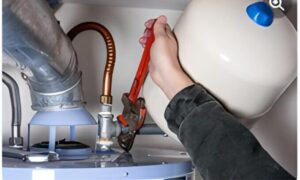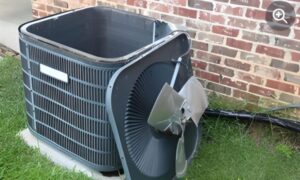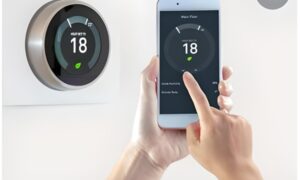The introduction of revolutionary heat pumps has sparked a significant shift in America's climate control, as homeowners seek more sustainable alternatives to traditional heating methods.
For instance, imagine a family in a low-income neighborhood who is burdened with high energy bills due to their outdated electric resistance heater. By exploring the advancements in heat pump technology, this discussion aims to shed light on how these innovative devices are transforming the way Americans heat and cool their homes.
From the benefits and challenges of heat pump installations, to the implications for low and high-income households, readers will discover the potential impact of this revolutionary technology on America's climate control.
The Importance of Heat Pumps
Heat pumps play a vital role in transforming America's climate control by providing efficient and cost-effective heating and cooling solutions for homes. These innovative systems use electricity to move heat from one place to another, rather than generating heat directly.
During the winter, heat pumps extract warmth from the outdoor air or ground and transfer it inside, effectively heating the home. In the summer, the process is reversed, and heat pumps remove heat from indoors, providing cooling.
This versatility makes heat pumps an attractive option for homeowners looking to reduce energy consumption and lower utility bills. Additionally, heat pumps help reduce greenhouse gas emissions by minimizing the use of fossil fuels for heating.
With the US government's plans to install 20 million heat pumps by 2030, the importance of these systems in achieving zero carbon goals can't be overstated.
Current Heating Methods in America
The majority of American homes utilize various methods such as electricity, natural gas, propane, or fuel oil for heating, with electricity and natural gas being the most common choices. Around 131 million homes in the United States rely on these heating methods.
Electric resistance heaters are still used in approximately 20 million homes, despite their inefficiency. Low and middle-income households tend to use these expensive electric resistance heaters.
On the other hand, about half of US homes are heated with gas, predominantly natural gas, although some use propane or heating oil.
It's worth noting that approximately 20 million homes have already adopted heat pumps, which provide more efficient and environmentally friendly heating solutions.
The Role of Heat Pumps in Climate Control
With approximately 20 million homes already utilizing heat pumps for more efficient heating solutions, their role in climate control is becoming increasingly significant. Heat pumps play a crucial role in both heating and cooling homes, providing a sustainable alternative to traditional heating methods that rely on fossil fuels.
By extracting heat from the outdoor air or ground and transferring it indoors, heat pumps can efficiently warm or cool living spaces. This not only helps to reduce energy consumption and greenhouse gas emissions but also contributes to cost savings for homeowners.
Additionally, the widespread adoption of heat pumps aligns with the government's plans to achieve zero carbon goals and improve energy efficiency in households across the country.
Government Initiatives and Plans
To accelerate the transition to more sustainable heating and cooling methods, the US government has implemented various initiatives and plans.
One of the key plans is to install 20 million heat pumps by 2030. This initiative aims to replace aging heating and air conditioning systems with modern heat pumps, which are seen as essential to achieving zero carbon goals.
Additionally, 40 percent of the benefits from the heat pump installations will be directed towards disadvantaged communities.
To incentivize the adoption of heat pumps, tax credits are available in the Inflation Reduction Act, covering a portion of the upfront costs for buying and installing heat pumps.
These government initiatives and plans are crucial in promoting the widespread adoption of heat pumps and transitioning to more sustainable climate control methods.
Challenges and Limitations of Heat Pumps
As we explore the challenges and limitations of heat pumps, it's important to consider the factors that can impact their efficiency and effectiveness in providing sustainable climate control.
One of the main challenges is that heat pumps' performance becomes less efficient in cold weather. Air-source heat pumps require heating the outdoor component in cold temperatures, reducing the energy available for indoor heating. To compensate for this, Scandinavian households often use additional heating sources like wood-burning stoves alongside heat pumps.
Another consideration is that heat pump economics vary depending on the heat needed and natural gas prices. While ground source (geothermal) heat pumps work better in cold weather, they're more expensive and require more land.
Despite these challenges, heat pumps can still reduce heating bills by up to $300 per year, benefiting low-income households with older, inefficient heaters the most. However, it's important to note that the short-term climate benefits of heat pumps are limited due to the reliance on fossil fuel-generated electricity. Additionally, increased electricity demand from heat pumps may strain power grids and require infrastructure upgrades.
Economic Implications of Heat Pump Installations
The economic implications of installing heat pumps can have a significant impact on both low-income households and higher-income households.
For low-income households, heat pump installations can provide immense benefits by reducing heating bills and improving energy efficiency. Older, inefficient heaters can be replaced with heat pumps, resulting in potential savings of up to $300 per year, according to the International Energy Agency. This can greatly alleviate the financial burden of heating costs for low-income families.
However, higher-income households may face higher upfront costs and longer payback periods for heat pump installations. While the long-term energy savings can be substantial, the initial investment can be a deterrent for some.
Therefore, it's important to consider the economic implications of heat pump installations for households across the income spectrum.
Considerations for Low-Income Households
Low-income households face unique considerations when it comes to installing heat pumps for their climate control needs. While heat pumps can provide significant cost savings in terms of heating bills, the upfront cost of purchasing and installing a heat pump can be a barrier for low-income families.
These households may not have the financial resources to invest in a heat pump, even with potential tax credits available. Additionally, the reliance on fossil fuel-generated electricity to power heat pumps may limit the short-term climate benefits for low-income households, as they may not have access to renewable energy sources.
It's important for policymakers and organizations to address these considerations and provide support to ensure that low-income households can also benefit from the energy-efficient and cost-saving potential of heat pumps.
Considerations for High-Income Households
Considering the unique circumstances of high-income households, there are specific factors to take into account when discussing the considerations for their adoption of heat pumps.
One important consideration is the upfront cost of installing a heat pump. High-income households may be more willing and able to afford the initial investment required for purchasing and installing a heat pump system. However, they may also have higher expectations for the performance and features of the heat pump, which could result in additional costs.
Another factor to consider is the potential energy savings and long-term cost benefits. High-income households may have larger homes and higher energy consumption, which means that the energy savings from a heat pump could be more significant for them.
Additionally, high-income households may be more concerned about the environmental impact of their energy use and may be more motivated to invest in sustainable heating solutions like heat pumps.
Future Implications and Infrastructure Needs
As the adoption of heat pumps increases, future implications and infrastructure needs become paramount. The widespread implementation of heat pumps will have significant implications for the energy grid and overall infrastructure.
One of the main concerns is the strain on power grids due to the increased demand for electricity. Heat pumps require electricity to operate, and as more households transition to this technology, the grid must be able to handle the additional load. This may require upgrades and improvements to the existing infrastructure to ensure a reliable and stable power supply.
Additionally, the installation and maintenance of heat pumps will require skilled professionals who can handle the new technology. Training programs and certifications will need to be developed to meet the growing demand for qualified technicians.
Frequently Asked Questions
How Do Heat Pumps Work and How Do They Differ From Traditional Heating Methods?
Heat pumps work by transferring heat from one place to another, rather than generating heat directly. They use a refrigerant to extract heat from the air, ground, or water source and then distribute it throughout a building.
This process is more energy-efficient than traditional heating methods because it relies on existing heat rather than creating it. Heat pumps differ from traditional methods like electric resistance heaters or furnaces because they can provide both heating and cooling functions, making them versatile and cost-effective solutions for climate control.
What Are the Environmental Benefits of Using Heat Pumps for Climate Control?
Using heat pumps for climate control offers several environmental benefits. They eliminate the need for fossil fuels, reducing greenhouse gas emissions and contributing to the goal of achieving zero carbon emissions.
Heat pumps also increase energy efficiency, resulting in lower energy consumption and reduced strain on power grids.
Additionally, heat pumps can help reduce dependence on non-renewable energy sources, promoting the transition to more sustainable and renewable energy options.
These environmental benefits make heat pumps a crucial tool in combating climate change.
Are There Any Alternative Heating Methods That Are More Efficient Than Heat Pumps?
There are alternative heating methods that can be more efficient than heat pumps in certain situations.
For example, in extremely cold climates, some households may use additional heating sources like wood-burning stoves alongside heat pumps to maintain optimal warmth.
Additionally, ground source (geothermal) heat pumps work better in cold weather but are generally more expensive and require more land.
The efficiency of heating methods depends on factors such as heat needed and natural gas prices.
How Will the Installation of 20 Million Heat Pumps by 2030 Affect the Electricity Grid?
The installation of 20 million heat pumps by 2030 is expected to have an impact on the electricity grid. As heat pumps rely on electricity to operate, the increased demand from these installations may strain the power grids. This could potentially lead to the need for infrastructure upgrades to accommodate the higher electricity load.
However, the exact implications will depend on various factors such as the distribution of heat pump installations, the existing capacity of the grid, and the availability of renewable energy sources.
What Are the Long-Term Implications of Widespread Heat Pump Installations on the Energy Sector and Infrastructure Needs?
The long-term implications of widespread heat pump installations on the energy sector and infrastructure needs are significant.
As more heat pumps are installed, there will be an increased demand for electricity, which may strain the power grids. This could lead to the need for infrastructure upgrades to ensure a reliable and stable supply of electricity.
Additionally, the shift towards heat pumps could also impact the energy sector, as it would reduce the reliance on fossil fuels for heating and contribute to achieving zero carbon goals.
Conclusion
In conclusion, revolutionary heat pumps have the potential to transform America's climate control by providing a sustainable and efficient alternative to traditional heating methods.
Despite challenges and limitations, government initiatives and tax credits are promoting the widespread adoption of heat pumps, particularly in low-income households.
While there are economic implications and considerations for both low and high-income households, the long-term benefits of reduced energy consumption and carbon emissions make heat pumps a promising solution for a more sustainable future.








